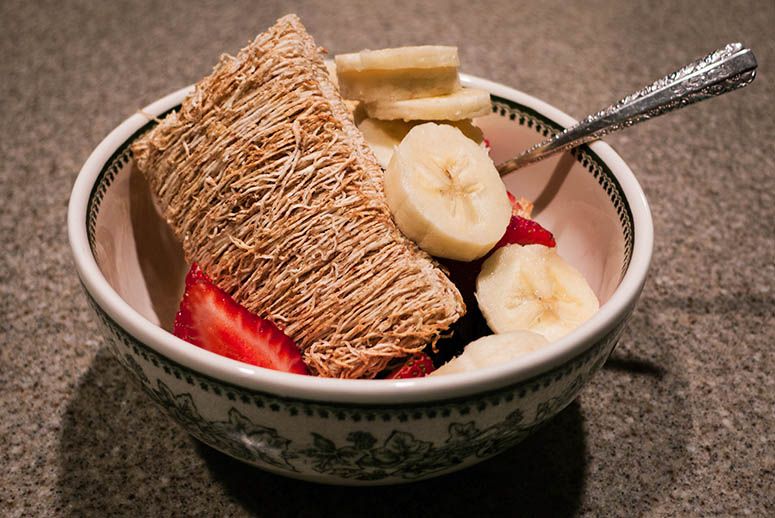One of the most wholesome breakfast cereals is the latest food product to test positive for glyphosate residue.

Shredded wheat. (Photo: Janet Tarbox/Flickr)
Jun 23, 2016· 2 MIN READ
Jason Best is a regular contributor to TakePart who has worked for Gourmet and the Natural Resources Defense Council.
The maker of one of the most popular breakfast cereals in America is being targeted by a national consumer group, which argues in a federal lawsuit filed Thursday that Shredded Wheat is not nearly as “natural” as it claims to be.
The Organic Consumers Association charges that samples of Shredded Wheat analyzed at an independent lab in California tested positive for glyphosate—better known by the Monsanto trade name Roundup—the most heavily applied weed killer in the history of U.S. agriculture. Shredded Wheat is made by Post, which is named as the defendant in the suit.
“On the back of its cereal box, Post says Shredded Wheat is made of ‘100% Whole Grain Wheat’ and that the product is ‘made with nothing but goodness,’ ” OCA’s international director, Ronnie Cummins, says in a statement. “But tests prove Shredded Wheat contains glyphosate, the active ingredient in Monsanto’s Roundup. Glyphosate is not only very unnatural—it is a known toxin, linked to a long list of potential and serious health problems.”
Testing found Shredded Wheat contained 0.18 parts per million of glyphosate, far below the level deemed acceptable by federal regulators. But the ubiquitous agrochemical has become the subject of intense scrutiny and public concern ever since the World Health Organization’s International Agency for Research on Cancer declared it a probable human carcinogen last year. The OCA suit against Post follows a similar lawsuit filed in May against Quaker Oats after lab tests found traces of glyphosate in the company’s Quick 1-Minute Oats.
Indeed, the results of a study released by the nonprofit group Alliance for Natural Health in April found glyphosate in almost half of the store-bought breakfast food items tested. The study was limited—just 24 foods were tested—but it suggested that concern over glyphosate’s pervasiveness in our food supply may be well founded and that, cumulatively, Americans may be consuming more of the chemical than previously thought. Glyphosate is most commonly associated with GMO crops such as corn and soybeans, which make up 80 percent or more of such crops planted in the U.S., but the chemical turned up not only in products made with those ingredients but in unexpected foods, such as cage-free organic eggs and dairy-based coffee creamer. Likewise, glyphosate is not heavily used on wheat, yet as the plaintiffs in the lawsuit against Post contend, the chemical is cropping up in Shredded Wheat.
All this might not be cause for alarm if the public could be assured that glyphosate is safe. But even as companies like Monsanto engineered a wholesale revolution in American agriculture right under our noses, unleashing both a new generation of GMO crops and a tidal wave of glyphosate that those crops are designed to withstand, federal regulators and their counterparts in many countries have more or less relied on the industry’s claims that glyphosate poses little risk to human health or the environment.
Yet in the wake of IARC’s decision to classify glyphosate as a possible carcinogen, the European Union is poised to allow its license for glyphosate to lapse, with France announcing this week that it would not vote to permit continued use of the chemical. If the license isn’t renewed, that would trigger a six-month phaseout of glyphosate in the EU. Meanwhile, the U.S. Environmental Protection Agency continues to hedge on releasing its evaluation of the cancer risk associated with glyphosate, and Monsanto is suing California to prevent the state from adding glyphosate to its list of known carcinogens.
That such confusion exists over the possible public health effects of a chemical that’s been in use for decades and has become the No. 1 herbicide in the U.S. seems shocking. Add to that the failure of the Food and Drug Administration to come up with a legal definition for the word “natural” on food labels, leaving an unsuspecting public to believe that foods marketed as, say, “100% all natural” must be required to adhere to some sort of enforceable standard—when nothing could be further from the truth—and you have a recipe for the sort of outrage that’s likely to fuel more Shredded Wheat–style lawsuits, possibly for years to come.
About Us
TakePart is the digital news and lifestyle magazine from Participant Media, the company behind such acclaimed documentaries as CITIZENFOUR, An Inconvenient Truth and Food, Inc. and feature films including Lincoln and Spotlight.
Privacy Policy Terms of Service


